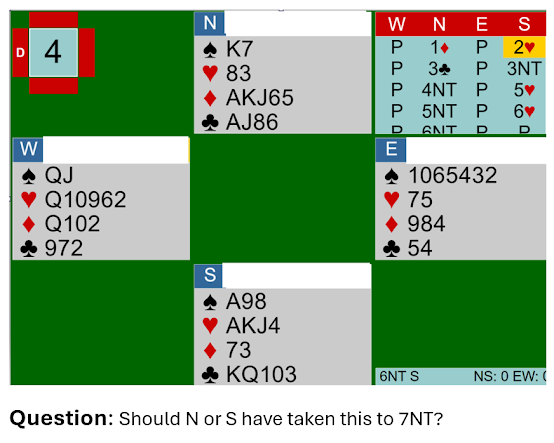Mark:
I'm looking for a nice way to say this. It looks like South
was having a long snooze. To begin with, South needs to open the bidding at the
first chance. Yes, the minor suit queens are downgradable, but having a 4
card spade suit upgrades the hand a bit and the heart queen isn't a deficit
along with the ace. If the ace of hearts was hidden, South should still bid,
though now he thinks he has only a doubleton. If South forgot to open and hears
partner open, this would not be a time to make a highly invitational bid
or explore for a fit in a suit other than hearts. You just bid 4 hearts
right now, knowing that you have the combined points to belong in game and
partner would pass if they opened with a minimum. North could have easily had
20 points and 6 or 7 hearts to open 1 heart. The hand would have been cold for
a slam, maybe a grand slam and here you are in 1 heart.
You asked what the bidding should have been. Here it is:
With E-W passing throughout, South opens 1 club north responds 1 heart, South
bids (up the line) 1 spade.
Now, North has a choice. The one bid that North
should not make is 2 hearts. That shows 5 or 6 hearts, but a minimum original
response, not a hand that is either interested or insistent on game. North
could bid 3 hearts, highly invitational and suggesting a 6 card suit and that
should propel them to game. South will surely bid 4 hearts at this point. In
expert circles North bids 2 diamonds over 1 spade. That is the 4th suit and is
forcing beyond the level of 2 spades, usually forcing to game, but expresses
uncertainty about suit vs. NT. South now bids 2 hearts over 2 diamonds, showing
3 card support (South didn't raise hearts initially, so he denied having 4.)
In any event, all reasonable auctions and even
some not so reasonable should land in 4 hearts.
At first, it may look like there could be a slam,
since there's only one loser. However, to make a small slam you not only need
to have no more than one loser, you need to have 12 winners. If E-W defend
patiently. and make no major mistakes, 12 winners will not materialize. Even
with the friendly break in trumps, even 11 tricks could be too much of a
challenge. However, 10 tricks is a pretty safe goal on the actual deal.



































